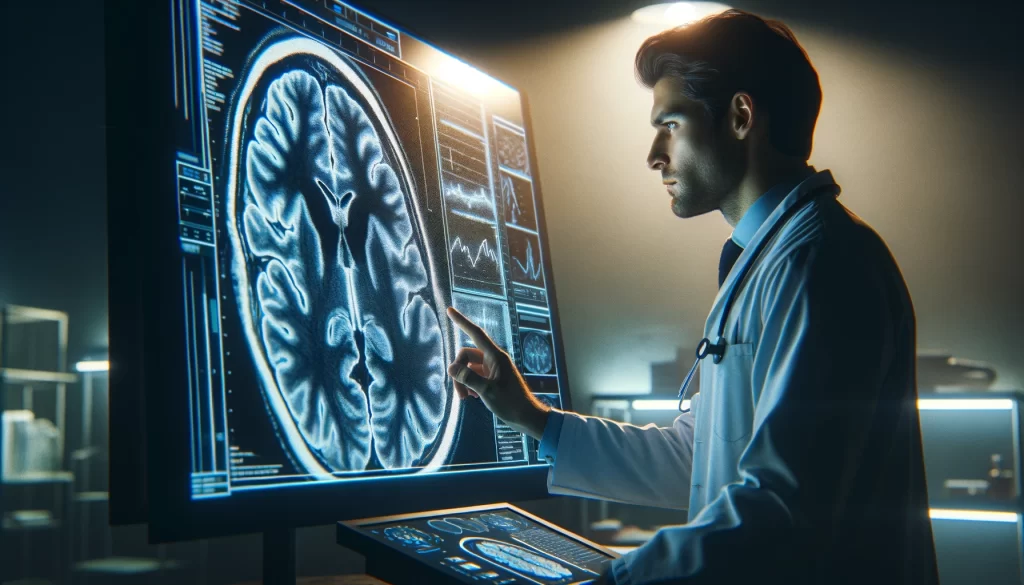Can Multiple Sclerosis Cause A Stroke?
 February 17, 2024 | Multiple Sclerosis
February 17, 2024 | Multiple Sclerosis
Can Multiple Sclerosis Cause A Stroke?
An ongoing debate in the medical community is the intricate relationship between multiple sclerosis (MS) and stroke risk. Recent studies have piqued the interest of neurologists and healthcare professionals alike, revealing compelling data that may shake the foundation of what we understand about these two debilitating conditions.
Specifically, a notable concern is whether the inflammatory pathways and the underlying neurodegenerative processes in MS might elevate the frequency of strokes in patients who are already grappling with this chronic illness.
Focusing on the intersection of Can Multiple Sclerosis Cause A Stroke, evidence points towards an uncomfortable truth: individuals with MS appear to stand at a greater stroke risk than the general populace.
With the goal to unravel the MS and stroke relationship, researchers have been meticulously poring over data from various databases. They’ve been examining whether the stroke risk in multiple sclerosis patients is significant enough to warrant a shift in how we approach the diagnosis, treatment, and, most importantly, prevention.

Table of Contents
- Key Takeaways
- Understanding the Link between Multiple Sclerosis and Stroke Risk
- Can Multiple Sclerosis Cause A Stroke: A Deeper Look into Shared Mechanisms
- Conclusion
- Frequently Asked Questions
Key Takeaways
- Recent research indicates a probable increased risk of stroke for individuals with multiple sclerosis.
- Understanding the MS and stroke relationship is crucial for developing proactive health strategies.
- Scientific studies support a higher incidence of ischemic strokes within the MS population.
- Preventative healthcare measures could significantly impact morbidity and mortality rates related to stroke in MS patients.
- Data aggregation from different studies is essential to draw conclusive information about stroke risk in multiple sclerosis.
- Enhanced clinical practice could emerge from the insights into MS’s potential role in stroke occurrence.
Understanding the Link between Multiple Sclerosis and Stroke Risk
Multiple sclerosis (MS), a neurological condition with far-reaching implications, has been under scrutiny for its potential to increase the risk of stroke—a leading cause of morbidity and mortality. Investigating the intersection between these two conditions is not only about charting statistical probabilities but also offering pathways for effective stroke risk management and prevention strategies for those living with MS.
The Epidemiology of Multiple Sclerosis and Stroke Incidence
Distinct geographical variations underscore the prevalence of MS, with a marked propensity for higher occurrence among women and within the 40 to 60-year age bracket. Conversely, stroke predominantly affects middle-aged and elderly adults, weighing heavily on their health and quality of life. Multiple sclerosis and stroke share a complex reciprocity, evidenced by exacerbated symptoms and an upsurge in cerebral ischemic events when they coexist.
Analyzing the Stroke Risk in Multiple Sclerosis Patients
MS patients confront an intricate spectrum of risk factors, with age and gender emerging as significant indicators that mirror the broader demographics of stroke. A conscientious scrutiny of these variables, therefore, becomes imperative to tailor preventative interventions effectively. In tying together observational studies with adherence to precise methodological standards like the MOOSE guidelines and the Newcastle-Ottawa Scale, a comprehensive perspective on the heightened stroke risk in MS patients as opposed to that in matched controls can be carved out.
Reflections from Comparative Studies
The correlation between MS and stroke risk unveils variable stroke occurrences contrasting between general populations and individuals with MS. Such disparities signal an intersectional influence of MS on stroke incidents, across different age and gender groups, which underscores the indispensable need for an integrative approach in managing stroke risk with multiple sclerosis.
As MS and stroke converge upon the lives of many, awareness grows regarding MS and stroke symptoms, with comprehensive prevention strategies becoming more pivotal. As the community strives to impart knowledge on preventing stroke in multiple sclerosis patients, the synthesis of current research advocates adopting early management practices derived from these multifaceted studies to ameliorate patient prognosis.
Can Multiple Sclerosis Cause A Stroke: A Deeper Look into Shared Mechanisms
Exploring the intricate connections between multiple sclerosis (MS) and stroke unveils a potentially symbiotic relationship with profound health implications. This section examines the underpinnings of MS that might predispose patients to a higher stroke risk, garnering valuable insights from research corroborated through systematic reviews and meta-analyses.
Pathophysiology of MS and its Impact on Cerebrovascular Health
The intricate pathophysiology of MS, characterized by immune-mediated inflammation and neurodegeneration, suggests a link to cerebrovascular disruptions leading to strokes. As the immune system erroneously attacks myelin sheaths within the nervous system, this inflammation might also affect cerebral vasculature, inciting a response that tips the balance toward a stroke event.
Insights from Meta-Analyses and Systematic Reviews
Systematic reviews unraveling the correlation between MS and stroke have deduced through weighted analyses that patients with MS face an accentuated stroke risk. These insights, cemented by meta-analyses, showcase the imperative for healthcare providers to adapt a nuanced approach tailored to gender and age factors that permeate the MS population.

Assessing Stroke Symptoms in MS Patients: Overlapping Clinical Features
Delving into symptoms, MS and strokes can manifest in a manner that clouds clinical judgment. The overlap in symptoms—whether it’s unanticipated dizziness, limb weakness, or slurred speech—may confound both patients and health practitioners alike, demanding a keen eye to tease apart these parallel clinical features.
Diagnostic Challenges and the Importance of Timely Medical Response
The convergence of symptoms between MS attacks and strokes leads to diagnostic dilemmas where the timeliness of a response could dictate health outcomes. Magnetic resonance imaging (MRI) stands as the cornerstone for differentiation, yet the immediacy of its utility is often limited by practical accessibility. Education and preparedness remain pivotal in managing these intersecting risk profiles.
Conclusion
The ever-strengthening link between multiple sclerosis (MS) and an increased stroke risk carries critical importance for healthcare professionals, serving as a call to action for both vigilant patient monitoring and immediate intervention when necessary. To effectively curb this risk, the health sector must adapt by intensifying their focus on both the implications for clinical practice and patient education. This involves ensuring that patients are acutely aware of the stroke symptoms, the need for urgent response to such symptoms, and the methods available for preventing stroke in multiple sclerosis patients.
Implications for Clinical Practice and Patient Education
In the clinical setting, understanding the relationship between MS and stroke underscores the necessity for healthcare providers to be ever-diligent. It’s crucial that they impart knowledge regarding the potential for stroke to their MS patients, emphasizing proactive measures and the significance of swift medical care if stroke symptoms arise. Educating patients about the identifying features of strokes versus MS exacerbations could substantially improve outcomes and patient autonomy in managing their health.
Key Strategies for Managing Stroke Risk with Multiple Sclerosis
When considering MS and stroke prevention strategies, a comprehensive plan must be established. Actionable steps include the effective control of modifiable risk factors like diabetes and heart disease, alongside close monitoring of blood pressure and cholesterol levels. Furthermore, fostering an environment of open communication between patients and healthcare providers can help in managing MS flares and understanding personal symptom patterns, thereby contributing to a robust defense against the potential onset of a stroke.
Future Perspectives on Research and Treatment Approaches
As for the road ahead, future research surrounding MS and stroke relationship is anticipated to illuminate the intricacies of their connection. This understanding will support the development of specialized interventions targeting the nuanced needs of MS patients. Moreover, the horizon looks promising with innovative treatment approaches for MS-related stroke, where personalized medicine may offer tailored solutions that not only prevent stroke but also enhance the overall quality of life for those living with multiple sclerosis.
Frequently Asked Questions
Can Multiple Sclerosis Cause A Stroke?
Research indicates that patients with multiple sclerosis (MS) are at an increased risk of any type of stroke compared to the general population, and specifically, a significantly higher risk of ischemic stroke. While MS does not directly cause a stroke, the inflammation and immune-mediated processes associated with MS may contribute to an elevated risk.
What is the epidemiology behind multiple sclerosis and stroke incidence?
Multiple sclerosis is an autoimmune disease with varying prevalence by region, often affecting individuals within the 40 to 60-year age range, and is more common in women. Stroke, on the other hand, primarily impacts middle-aged and older adults and is a leading cause of death and disability worldwide. Both conditions together can severely impair quality of life.
How is the stroke risk in multiple sclerosis patients analyzed?
The stroke risk among MS patients is analyzed through observational and comparative studies, using systematic reviews and meta-analyses. These studies evaluate factors such as gender and age and their consistency in contributing to increased stroke risk. The studies often utilize large patient databases to compare the incidence of stroke in MS patients with that of the general population.
Are there known direct correlations between MS and stroke?
A direct correlation between MS and stroke has been suggested through systematic reviews, indicating an increased stroke risk in individuals with MS. While a definitive causal relationship is still under investigation, there is evidence that the cerebrovascular inflammation in MS patients may be a contributing factor to an increased risk of stroke.
What reflections from comparative studies exist regarding stroke risk in MS?
Comparative studies reflect variations in stroke occurrence between the general population and those with multiple sclerosis, with disparities highlighted when stratified by gender and age groups. They suggest that MS may influence an individual’s likelihood of experiencing a stroke beyond typical stroke demographics.
What is the impact of MS pathophysiology on cerebrovascular health?
The pathophysiology of MS involves immune-mediated inflammation, demyelination, and axonal damage which potentially contribute to increased cerebrovascular issues, such as stroke. This indicates a complex relationship between the neuroinflammatory processes in MS and vascular health, potentially leading to conditions like ischemic stroke.
How do insights from meta-analyses and systematic reviews contribute to our understanding?
Insights from meta-analyses and systematic reviews contribute by pooling data from multiple studies, consistently reporting an increase in stroke risk among individuals with MS. They emphasize the need for better recognition of stroke within the MS demographic, taking into account factors like sex and age, to improve preventative and treatment strategies.
Can MS symptoms be confused with those of a stroke?
Yes, MS and stroke share overlapping symptoms such as confusion, dizziness, headaches, limb weakness, speech difficulties, mobility issues, and visual problems. This can be a diagnostic challenge, as differentiating between an MS flare-up and stroke onset is crucial since they require different medical responses.
Why is timely medical response crucial for MS patients who might be experiencing a stroke?
Timely medical response is crucial because the treatment and prognosis for stroke are time-sensitive. Prompt diagnosis and intervention are essential to minimize brain damage and improve recovery outcomes. Delays in identifying and treating a stroke can be detrimental to survival and long-term health for patients with MS.
What are some key strategies for managing stroke risk with MS?
Managing stroke risk in MS involves controlling modifiable risk factors like diabetes, heart disease, high blood pressure, and high cholesterol. It also includes managing MS flares, being aware of individual symptom patterns, and maintaining clear communication with healthcare providers to implement effective prevention strategies.
What are the implications for clinical practice and patient education regarding MS and stroke?
The implications for clinical practice involve vigilant monitoring and early interventions for MS patients at increased risk of stroke. Educating patients on stroke symptoms and the importance of immediate medical attention is also critical. This improved awareness can be life-saving and can prevent long-term complications.
What future perspectives exist on research and treatment approaches for MS-related stroke risk?
Future research is expected to delve deeper into the underlying mechanisms linking MS and increased stroke risk, aiming to identify specific interventions to mitigate the risk effectively. There is also an anticipation of innovative treatment approaches evolving, with personalized medicine likely playing a more significant role in managing MS and associated stroke risk.

Hi there. I’m Angela…and I live daily with chronic illness. For the longest time, I suffered in silence for fear of being judged or criticized. When I finally started opening up, I realized that I’m not alone in all of this and if you have a chronic illness, neither are you!
ABOUT

Hey there! I'm Angela,
I am a survivor of cancer, lupus, fibromyalgia, and a teenage daughter. Join me as I document my experiences and educate the world on my chronic illness journey.


